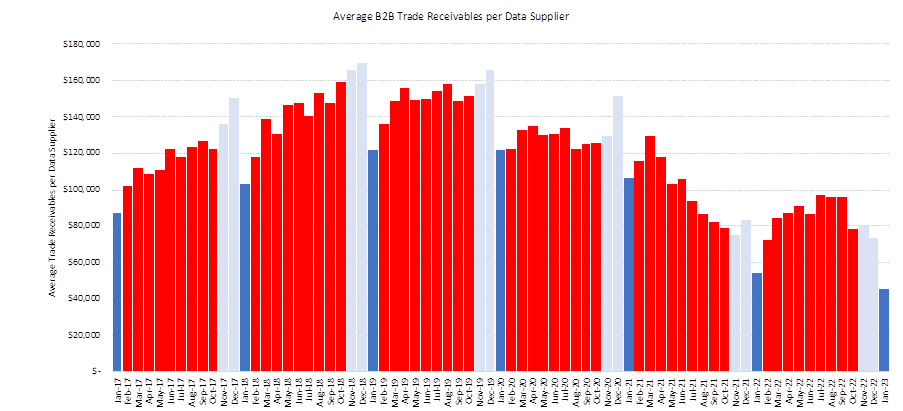Trade receivables plunge to record low: CreditorWatch
BusinessThe agency’s business index for January shows key data going in a negative direction.

The outlook for business has taken a turn for the worse with key data — trade receivables — from CreditorWatch plunging to its lowest point since the agency began collecting the data in 2015.
The agency said trade receivables, which measured the average value of invoices, had been sliding since July last year and the 39 per cent drop in January compounded the usual seasonal fall.
In a raft of bad data, the January Business Risk Index also showed business-to-business trade payment defaults had risen 39 per cent year-on-year in “a clear upward trend” with hospitality the sector most likely to default “by a considerable margin”.
The agency said external administrations were expected to revert to the rising trend in February following a seasonal dip and credit enquiries were up “a massive 129 per cent year-on-year in January” as a likely consequence of the Optus and Medibank data breaches.
CreditorWatch CEO Patrick Coghlan said he was surprised by plunge in trade receivables and that meant small and medium businesses were in for a tough year.
“The upward trend in trade payment defaults, in particular, should definitely be of concern to business owners,” he said. “A reduction in revenue in any businesses is never a good thing.”
“The RBA’s tightening of monetary policy is beginning to bite, on top of other challenges like labour shortages and supply chain disruptions.”
But he said inflation was the biggest challenge and the RBA had little choice but keep the pressure on.
“The number one priority has to be to get inflation under control — pretending it’s not a problem is not an option. Unfortunately, the RBA has to turn the screws in order to sort that out and then hopefully it doesn’t stall the economy.”

RBA governor Philip Lowe warned the Senate estimates committee this week that further rate rises were likely because the bank’s nine increases since last May might have failed to curb inflation.
“All the evidence is that if inflation stays high for too long, expectations adjust and that ultimately leads to higher interest rates and more unemployment,” he said.
With annual inflation to December at 7.8 per cent, the Westpac-Melbourne Institute index showed consumer confidence at historic lows this week and economists are increasingly warning of a recession.
Mr Coghlan said compared with a year ago, supply and labour constraints had eased and Australian businesses were very resilient.
“If you go back to the second half of 2021, a lot of businesses were able to tread water and just wait for that certainty of when everything’s going to open back up again. Once they had that certainty, they started hiring, they started investing, they started buying goods.
“The stats are still pointing in all sorts of different directions globally and locally,” he said. “February and March will be really important to look at — every month is going to be eye-opening.
“Hopefully it will be a shallow downturn. But I think it’s definitely going to get worse before it gets better.”
CreditorWatch chief economist Anneke Thompson said the declining business conditions would have flow-through effects on the job market.
“One of the likely results of this slowing of business activity is rising unemployment,” she said.
“Employment conditions have been extremely tight, so any rise in the unemployment rate will likely still see the rate at very low levels in overall terms. It will also dampen wage growth, something the RBA is very keen to keep at moderate levels so as not to induce a wage-price spiral.”




